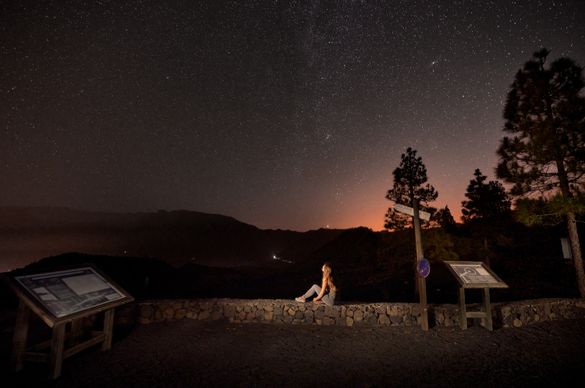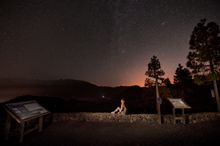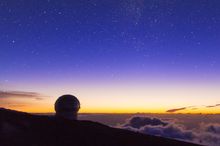 06 Dec 2023
06 Dec 2023
The Canary Islands offer vibrant skies and untouched landscape akin to a movie. With four UNESCO-designated Biosphere Reserves, the archipelago is considered one of the best places on the planet to witness celestial events given its distinction for possessing the clearest skies in Europe.
This year's most intense meteor shower, the Geminids shower, will be visible to the naked eye on the night of December 13th, with an average of over 100 shooting stars to be observed per hour.
Canary Islands' Sky Protected by Law
The Canary Islands have been pioneers in establishing a law accrediting the protection of their skies against light pollution.
Since 1988, the archipelago has recognised and defended its unique conditions for nocturnal sky observation, leading to the boom in private enterprises specialising in guided night tours and observation sessions from spectacular viewpoints.
The Canary Islands are home to two significant headquarters dedicated to unraveling the mysteries of the universe: the Roque de los Muchachos Observatory in La Palma and the Izaña Observatory in Tenerife, near the Teide National Park. These headquarters belong to the Institute of Astrophysics of the Canary Islands (IAC) and are situated in Tenerife and La Palma. Alongside Fuerteventura and Gran Canaria, these islands have been declared 'Starlight Reserves and Destinations' by the Starlight Foundation, making them ideal for both astronomical tourism and astrophysics.
El Hierro's La Frontera is a Starlight Municipality, and La Gomera and Lanzarote are in the process of obtaining recognition as Starlight Destinations. La Graciosa, with its minimal nighttime illumination and a population of around 300, is also a paradise for stargazing.
To witness the maximum number of Geminids, you must position yourself in a dark location, free from city light with clear horizons. This phenomenon is best enjoyed by lying on the ground and gazing at the sky watching as the falling Geminids leave a burning trail as they fly through the sky.
Visible from Every Island: Viewpoints
The key locations for observing meteor showers include the Roque de los Muchachos Observatory in La Palma and the Izaña Observatory in Tenerife, however, for the Geminids shower, there are numerous options available across the archipelago.
In Tenerife, besides the pull-offs leading to the Teide National Park, the best spots for Geminids observation are within the park itself due to its vast grounds and remote location. Miradores like Montaña Colorada or Chivisaya, as well as beaches like Benijo or Los Patos.
In La Palma, there are over twenty astronomical viewpoints for Geminids observation, including the Mirador al Infinito, Llano del Jable, La Muralla, Mendo, or any point on the Roque de los Muchachos. The experience is also marvelous around the La Caldera de Taburiente National Park, Mirador de la Cumbrecita, or El Charco Verde.
Gran Canaria features viewpoints such as Degollada de las Yeguas (known as Mirador de Fataga), as well as Las Cañaditas, El Mulato, Presa de los Hornos, or Degollada de Las Palomas.
On islands like La Gomera, you can head to high-altitude areas like Alto de Garajonay or the Recreational Zone of Las Nieves. Geminids are visible from all altitude zones on this island, including the surroundings of the Garajonay National Park, the Las Asomadas Observatory or around the Pico de Malpaso.
In lower-altitude islands like Lanzarote, there are also suitable places to observe Geminids, such as Peñas del Chache. Fuerteventura boasts astronomical viewpoints like Sicasumbre in Pájara.
La Graciosa, with its vast stretches of secluded golden sandy beaches, is an island in itself for Geminids observation, away from the hustle and bustle where you can truly enjoy the natural phenomenon.




